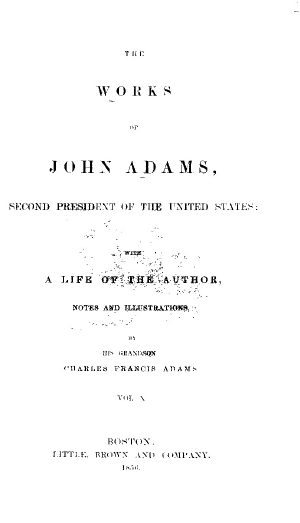
Part of: The Works of John Adams, 10 vols. The Works of John Adams, vol. 10 (Letters 1811-1825, Indexes)
- Charles Francis Adams (editor)
- John Adams (author)
A 10 volume collection of Adams’ most important writings, letters, and state papers, edited by his grandson. Vol. 10 contains letters and state papers from 1811 1825 and Indexes for the entire set.
Key Quotes
Revolution
Adams to Jefferson, Quincy, 15 August, 1823: I am no king killer, merely because they are kings. Poor creatures! they know no better; they sincerely and conscientiously believe that God made them to rule the world. I would not, therefore, behead them, or send them to St. Helena to be treated like…